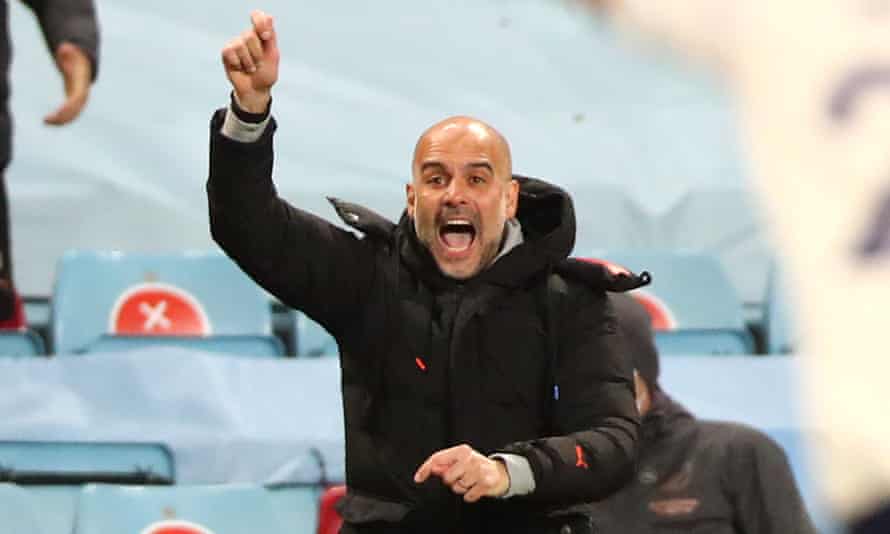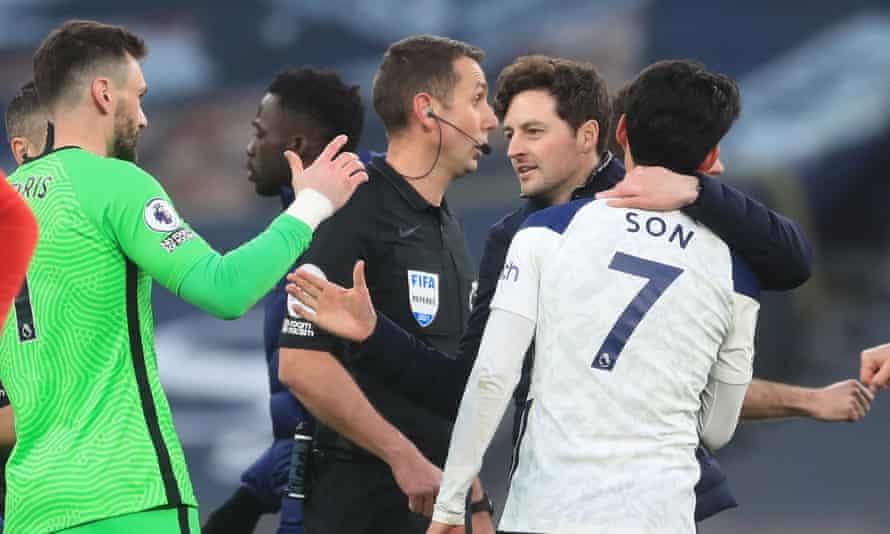OK, so where are we now? What version of the current deranged timeline is this? From serfs of the billionaire overclass on Monday, to Stone Island Bolsheviks capering down the Fulham Road on Tuesday, English football’s week of insurrection has cast a strange, disorientating light across everything in its path.
During the brief lifespan of the European Super League Sunday’s Carabao Cup final had already begun to look like, if not the most sickly, putrid, disfranchised occasion in the modern history of English football, then certainly one of them.
For a start, it is of course, the Carabao Cup. This is an awkward, diminished competition at the best of times. Add to this the presence of two finalists from the ESL group, Manchester City and Tottenham, clubs whose owners have stated, emphatically and unequivocally, that they simply don’t care about the Football League, that this is all an inconvenience to their own dazzling future prospects. Frankly this was all starting to look a little deathly. Fire up the band. Put out more flags. Does anyone actually still want to do this?
Fast-forward a week and the landscape has altered. With the collapse of the breakaway plan this is an occasion that suddenly feels vital, poignant and layered with nuance.
For a start, say its name. No, not Carabao. Forget – with all due respect to Carabao – Carabao. This is the League Cup, the cup of the Football League, 61 years old now and an extension, ultimately, of the beleaguered but enduring pyramid itself. It may be a second-rank midweek thing, additionally menaced by the new-look beefed-up Champions League (the alternative billionaires’ beano smuggled through this week). But it is at least an entirely valid piece of sporting competition.
No matter how dour the game, how weakened the teams, how incidental the entire occasion, this final will still be more interesting, more energised, more legitimately inside the matrix of actual competitive sport than a piece of bloodless closed-set reality TV. And whichever way it swings, the supporters of either club – if not, it seems, the owners – will be delighted to win a trophy.
For all the grand plans, City’s spring and summer Wembley away-days have been perhaps the most joyful part of this whole project. As for Spurs, victory at Wembley would make it three minor trophies in the last 22 years. There is a jaw-dropping degree of unearned arrogance in the idea the club’s hierarchy thinks it has the right to roll its eyes and act bored in the face of this level of competition, just another glazed super-giant in search of fresh horizons to conquer.
There are further dramatic tensions among the cast. To his credit Pep Guardiola came out and publicly tore the head off the whole wretched enterprise while it was still a live concern, as did several of his players. Quite how that disconnect with the ownership plays out over time, here and elsewhere, will be fascinating to see.

Best of all Wembley will open its doors to 8,000 spectators. It is a first opportunity to gather together since fans – legacy fans – became the enemy, the resistance, the digital underclass. Sunday will give freedom to vent, celebrate, and express en masse that sense of triumphant dissent.
This is the wider hurricane swirling around Manchester City versus Tottenham Hotspur, a 4.30pm BST kick-off at the far end of a fraught week. There are more self-contained subplots too. Consider for a moment the absent silhouette of José Mourinho, whose own time as an elite generational manager also comes to a symbolic halt on Sunday, denied even a final facing-off with his old rival.
This is what it has come to for José, replaced not by Antonio Conte or Zinedine Zidane, but by a 29-year-old with precisely zero managerial experience. This, it turns out, is who Spurs would prefer took them into a cup final.
The presence of Ryan Mason adds a wildcard element. Nobody knows what kind of manager he is, not even Mason himself. Although obviously there would be a delicious irony if he turns out to be a scowling seven-at-the-back defensive nihilist intent on winning the game with an 89th-minute own goal.

In the projected absence of Harry Kane it seems likely Spurs’ best hope is counterattack, pace on the flanks and ruthlessness when finding some space behind the City full-backs. Against Southampton on Wednesday Mason played 4-2-3-1, with Tanguy Ndombele part of the central midfield pivot and Gareth Bale, Steven Bergwijn and Harry Winks on the pitch at the end. Wembley may bring a more defensive-minded starting XI.
It might be tempting to assume City will have lost a little urgency now this final is no longer part of the media-led fantasy of “an unprecedented quadruple”. Guardiola will clearly be focused on the Champions League from here, with the semi-final first leg against Paris Saint-Germain looming.
There will be rotation. Zack Steffen will play in goal. John Stones is absent after his red card against Aston Villa. But this is also a time when only winning makes any sense, and when City are looking to re-establish those metronomic rhythms after a slight stumble and a drying up of the run of clean sheets.
These teams have already played out two significant Premier League games, bookends to the strangely brief flowering of José’s Spurs. The 2-0 win at Tottenham Hotspur Stadium in November was the prelude to some dizzy talk of title pushes, and of a happy, functional unit.
Sign up to The Recap, our weekly email of editors’ picks.
This is how brief the life of a Mourinho team is these days, a kind of butterfly existence, one day to live and love and flap those sullen, gimlet-eyed wings. Spurs went to the Etihad in February and were swatted aside, part of a run of five defeats in eight that sealed the sense of entropy.
And so the Carabao Cup has its moment. The life force may be draining out of this middle-aged add-on, but it is worth remembering it came from the same place as the Super League. Like everything else in football, this was always a commercial enterprise, a way of sweating more revenue from the asset, inspired by the growing popularity of midweek European football, by the spread of floodlights, and a political move in the longstanding power-play with the Football Association.
Even its name changes trace the game’s modern commercial history, a journey from Milk, to Littlewoods, Rumbelows, Coca-Cola, Worthington, Carling, Capital One and finally, perhaps, the Carabao supremacy. If this really is to be one of the last of these occasions it feels like a moment of late-breaking significance, a little poignancy in the face of the future, for the other (but still proper) English cup.
from Football | The Guardian https://ift.tt/3etwxuy
via IFTTT

No Comment